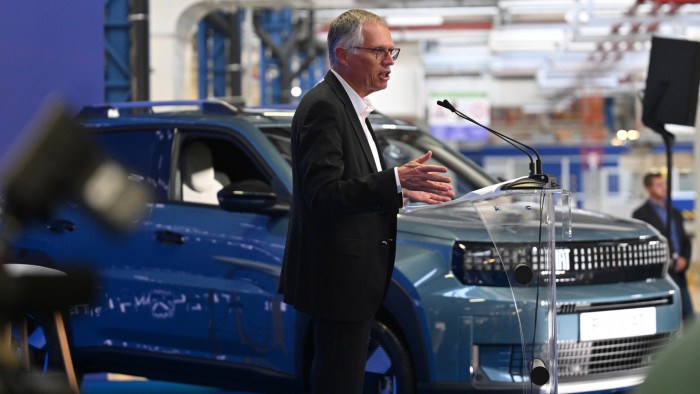Unlock the Editor’s Digest for free
Roula Khalaf, Editor of the FT, selects her favourite stories in this weekly newsletter.
Stellantis’s chief executive Carlos Tavares has resigned following a sharp decline in financial performance at the world’s fourth-largest carmaker, marking an abrupt exit for one of the automotive industry’s most high-profile leaders.
In a statement on Sunday, Stellantis, which owns the Peugeot, Fiat and Jeep brands, said the company’s board accepted the resignation of Tavares, without explaining exactly why he had stepped down.
In September, Stellantis launched a search for a successor to Tavares, but he had been expected to complete his term as chief executive through until early 2026.
Stellantis shares dropped 6.4 per cent in early trading in Milan on Monday.
Tavares joined France’s Peugeot owner PSA in 2014, saved it from near insolvency, and then helped forge Stellantis by buying Germany-based Opel from General Motors in 2017. A €50bn merger with Fiat-Chrysler followed in 2021.
John Elkann, Stellantis’s chair, said “our thanks goes to Carlos for his years of dedicated service and the role he has played in the creation of Stellantis”.
The company said the process to appoint a new chief executive would be concluded by the first half of 2025. Until then, a new interim executive committee led by Elkann will be formed.
Henri de Castries, Stellantis’s senior independent director, said the company’s success had been rooted in “perfect alignment” between its shareholders, board and chief executive. “However, in recent weeks different views have emerged which have resulted in the board and the CEO coming to today’s decision,” he added.
People familiar with Tavares’s departure said there had been increasing tensions between him and other Stellantis board members on how to put the company back on track following a steep decline in reported profits in 2024 due to slumping sales in the US and Europe. Stellantis’s shares have fallen 43 per cent this year.
“[Tavares] was focusing on the short term rather than the group’s longer term and managed to anger everybody in the process,” said one person familiar with conversations among the Stellantis board members.
A second person with knowledge of the deliberations said: “There was a sense that Carlos was moving too fast to retrieve his reputation at the risk of creating problems in the future.”
Stellantis, which built a strong balance sheet through sweeping cost cuts, issued a profit warning in September. The company said at the time that its free cash flow would be negative in 2024, in the range of €5bn to €10bn.
Another person briefed on Tavares’s resignation said the situation inside Stellantis and with the company’s stakeholders, including suppliers and dealers in the US, had become strained.
Disgruntled factory workers in Italy and the US had threatened strikes following production cuts.
Tavares did not immediately respond to a request for comment. News that he was stepping down was first reported by Bloomberg.
Stellantis on Sunday confirmed its 2024 financial guidance, including its target for an adjusted operating profit margin of 5.5 per cent to 7 per cent.
Bernstein analyst Daniel Roeska said Elkann had shown “good instincts” in the past when choosing a new chief executive.
He added: “We would expect that the board will be looking at a mix of internal and external candidates, but the interim period will be difficult for the company’s management and investors alike.”
In July Tavares had brushed off concerns about Stellantis’s performance, describing the drop in sales as a “bump in the road” as he vowed to “fix” the problems. In October he oversaw a management shake-up at the company’s brands, including Jeep, Maserati and Alfa Romeo.
The changes were interpreted by analysts as a sign Tavares was not planning to step down before the end of his term.
Read the full article here




